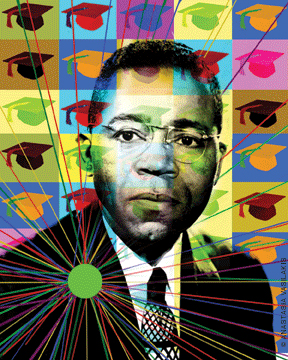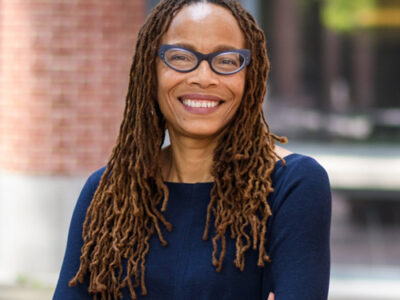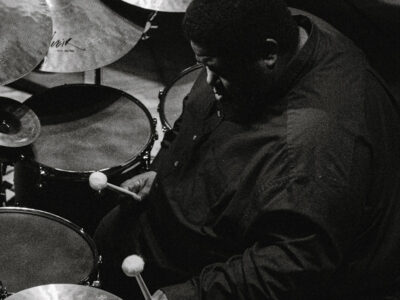
The news in Progress Report on Minority Equity—an assessment of minority-faculty hiring at the University released in December by Penn President Amy Gutmann and Provost Ronald Daniels—was, relatively speaking, positive. Although “a large number of Penn’s departments still contain no minority faculty members,” minority representation among the standing faculty rose by about 2 percentage points between 2003 and 2006, to 16.6 percent, and more than a quarter of new faculty hires were Asian (just under 18 percent), black (4.5), or Hispanic (4.3). Compared to peer institutions, Penn scored slightly better in terms of hiring black faculty and a little worse for the other two groups, but the range among schools was “quite narrow,” the report notes. (See the December 4, 2007 issue of Almanac, the University’s journal of record, at www.upenn.edu/almanac for the full text.)
While offering “some heartening evidence of success,” the report “underlines as well the need for perseverance and creativity in our efforts to build a diverse and exceptional faculty.” Along with improved recruitment and retention and better information systems, the report cited the need to encourage more members of minority groups to pursue advanced degrees and subsequent careers as professors.
One of the longest-running efforts at Penn or anywhere else aimed at providing both financial support and a social/professional network for minorities and other under-represented groups in academe is the Fontaine Society, established in 1970 in honor of Dr. William Thomas Valeria Fontaine Gr’36.
Fontaine was the first African American to hold a tenured faculty position at Penn, serving as a lecturer, assistant professor, then associate professor of philosophy from 1947 until his death in 1968. The society that bears his name can be seen as an antidote to the ironic and tragic professional fate that claimed the man himself. As portrayed by Dr. Bruce Kuklick, the Nichols Professor of American History, in his new book Black Philosopher, White Academy (University of Pennsylvania Press), Fontaine’s isolated position “as an African American [who] lectured more or less alone in the first-rank institutions of learning of the United States,” did much to thwart his ambitions and stunt his contributions as a scholar.
“The idea [behind the Fontaine Society] is to try and increase the diversity of the student body by reaching out to students who face significant barriers in coming to university, and to provide financial support, but also moral support and direction” once they’re here, says Provost Daniels. Universities expend a lot of effort on recruiting more effectively in pursuit of faculty diversity, which is certainly important, he adds, “but if there isn’t some effort made to increase the pipeline of students, then we’re just spinning our wheels against a fixed pool of candidates.”
According to Karen Lawrence, assistant vice provost for graduate education, there are currently about 180 Fontaine Fellows, representing the range of the University’s schools. A recent study of Fontaine alumni over the years shows that many have gone on to tenured and tenure-track positions, from acting chair of the Department of American Civilization at the Community College of Philadelphia to a systems-engineering PhD serving as associate dean at the University of Witwatersrand in South Africa (to cite the first and last items on an online list). “It’s not the only way one evaluates the performance of the program,” says Daniels, “but it was very encouraging for us to see that it had had that impact.”
Along with funds from the recipients’ departments and schools, Fontaine Fellowships cover four or more years of expenses for tuition, other fees, and student health insurance, and also provide a stipend. In addition to under-represented minority groups, the program is also open to economically disadvantaged and first-generation college students pursuing advanced study. Most are offered the fellowship as part of their recruitment by Penn, says Lawrence, but occasionally students become fellows later in their doctoral studies.
The society also sponsors regular meetings and get-togethers, climaxing with a conference spotlighting members’ work-in-progress and an annual dinner. “The hope is that there is a core and a sense of community that evolves within that group that can provide support to each other while they are at Penn and that will continue after graduation,” Daniels says.
Fontaine Fellow Dr. Loretta Sweet Jemmott GNu’82 Gr’87 [“And Still I Rise,” November 1997], the van Ameringen Professor in Psychiatric Mental Health Nursing and director of the Center for Health Disparities Research, calls the current version of the program “phenomenal”—though much different from when she was named to the society in 1985. Back then, she says, it was certainly an honor to receive the fellowship and a welcome support financially, but in terms of any resulting social network, she says, there was “nothing.”
When the Fontaine Society was first founded, Lawrence says, funds were distributed from an endowment created by Dr. Fontaine’s friends and colleagues, one or two thousand dollars at a time.
Outcomes for the most part were disappointing, she adds, and in the early 1990s the emphasis shifted to more involvement and a greater commitment by the University’s schools to ensure that fellows would receive continuing support. The signature Fontaine events—like the conference and dinner, and less formal occasions like lunchtime “Chat and Chews” with faculty members and “Thirsty Thursdays” happy hours—evolved over time, organized by student volunteers with, several say, a healthy assist from Lawrence.
Dr. Anne Charity Gr’05, now an assistant professor of English, linguistics, and black studies at the College of William and Mary, learned about the Fontaine Fellows program through her dissertation adviser in the linguistics department, Dr. William Labov [“Continental Drift,”May|June 2006]. “The program was central to both my financial support and my sense of community at Penn,” she says. “Being a Fontaine Fellow gave me a broader appreciation for African-American scholarship and provided me with many of the professional and social skills that I needed to do well as an assistant professor.”
Charity recalls that, at the time she arrived at Penn, the only other African-American student in the doctoral program in linguistics was “ABD [all-but-dissertation] and already working full time.” Besides attending many Fontaine-sponsored events during her five years at Penn, through the society she became involved in working with minority undergraduates as “the head graduate fellow in the Africana Studies pre-first-year program and head graduate instructor for the McNair Scholars program” (a federal program that helps under-represented and economically disadvantaged undergraduate students prepare for graduate study). Those experiences were “invaluable,” she adds, and led to her “present position at a liberal-arts, undergraduate-focused college.”
Overall, Charity calls her Penn years “crucial to my understanding of African-American culture.” As one of the few students in her doctoral program “working on issues of African-American language and culture,” she says, “I was glad to have another group of minority students and faculty that I could share ideas and have fun with.”
While her parents and siblings also have earned advanced degrees and attended Ivy League schools, Charity valued the “opportunity to share my journey and experiences” with other Fontaine Fellows, whose families had a variety of academic backgrounds. “We all encouraged each other,” she says.
Currently, Charity—who also directs the linguistics laboratory at William and Mary—is completing a National Science Foundation postdoctoral fellowship in linguistics. “I’m working with both public and private schools in central Virginia,” she says, “and we are working to expand both student and teacher understanding of language variation to help students do their very best.”
By the time she had come to her second year as a doctoral student in the School of Nursing, with a minor in organizational dynamics, Dr. Pamela Jackson-Malik Gr’05 “wasn’t sure how I could meet all of my obligations and continue in graduate school,” she says. An adult, non-traditional student with established family responsibilities, she had already managed to earn a nursing degree and an MBA, making ends meet with student loans, savings, and part-time work—but when it came to her PhD it looked like that wasn’t going to be enough.
Then Dr. Susan Gennaro, professor emeritus of nursing, asked her if she’d ever heard of the Fontaine Society—she had, “vaguely”—and urged her to investigate the possibility of a fellowship. “I took her advice and spoke to other doctoral students and went to a couple of the Society’s meetings. I liked what I saw, heard, and felt,” Jackson-Malik recalls. “My peer minority graduate students were very helpful about campus-life survival and what to expect as I pursued my doctoral degree.”
The fellowship’s financial support “allowed me to forgo a massive student loan and concentrate on course work and my dissertation proposal,” Jackson-Malik adds. Travel funds from the Society also helped underwrite a research trip to Europe to interview World Health Organization representatives and parliament members and administrators from the health ministries of Sweden, the Czech Republic, and Switzerland on issues related to her dissertation on organizational climate and hospital nurses’ job satisfaction, burnout, and intent to leave, she says.
The sense of community the Society provided was equally welcome. “Although my doctoral faculty and fellow graduate students were supportive, we didn’t have the same cultural experiences. We didn’t always speak the same language, listen to the same music, and we didn’t eat the same foods,” she says. “What I liked most about the Fontaine Society was that it gave me a group of people who I could identify with and who understood where I was coming from.”
Jackson-Malik received a Fontaine Society Service and Leadership Award in 2005, and served on the Society’s coordinating, travel, and professional development committees for four years, she says, while also being active in numerous other student activities—including drawing cartoons for The Daily Pennsylvanian and writing occasional articles. Her artistic skills have also been called upon to design many of the Fontaine Society’s invitations, programs, brochures, and posters.
Jackson-Malik notes the “special challenge” of being in the “spotlight” as a minority doctoral student at Penn. “You knew you had to do well because failure was not an option.” The peer support and social activities the society provided were something “to fall back on,” she says, and she has remained involved since graduating.
Currently, Jackson-Malik is a nursing research scientist and associate chief nurse of nursing research at the Philadelphia VA Medical Center, and an adjunct assistant professor at the School of Nursing. “I lecture on nursing administration and organizational-climate issues,” she says. “I have funded grants on chronic-disease management related to congestive heart failure, diabetes using Telehealth interventions, and a VA Public Health Community Outreach Program on rapid testing for HIV.”
Dr. Nisha Botchwey GCP’99 Gr’03 echoes her colleagues’ words of praise. “The Fontaine Society was a wonderful social support system!” she says. “It provided the financial support necessary for me to get through my PhD studies and writing without having to work or take classes part-time.”
But the assistant professor of architecture at the University of Virginia may have even more reason than the typical Fontaine Fellow to value the experience. Rather than learning about the fellowship from a professor, she was introduced by another Penn graduate student who was already active in the society and with whom she still keeps in close contact: her husband of 10 years now, Edward Botchwey GEng’99 Gr’02, assistant professor of biomedical engineering and orthopedic surgery at the University of Virginia. Besides marrying as graduate students, they had their first child at Penn.
—J.P.




